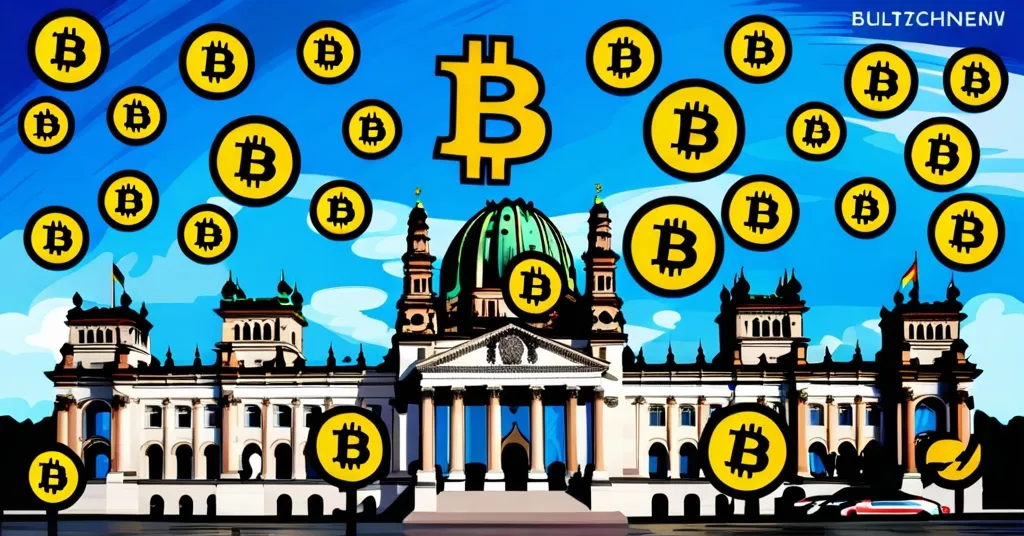Germany Explores Bitcoin Adoption: Bonds on Blockchain, Bitcoin Reserves, and ETFs Proposed

Germany Explores Bitcoin Adoption to Boost Digital Currency Competitiveness
Germany is taking significant steps towards integrating Bitcoin into its financial system, as highlighted at a recent Blockchain Roundtable in the German Parliament. Former Finance Minister Christian Lindner has proposed innovative measures to elevate Germany’s position in the digital currency space. Amidst political motivations and market dynamics, his proposals signal a potential shift in how cryptocurrencies are approached not just in Germany but across the European Union.
- Blockchain Roundtable in German Parliament
- Lindner’s proposals: bonds on blockchain, Bitcoin as reserve, Bitcoin ETFs
- Recent sale of seized Bitcoin by Germany
- Political context and criticism
At the heart of the discussion, Christian Lindner unveiled a series of proposals aimed at enhancing Germany’s digital currency competitiveness. One of his boldest suggestions was to issue government bonds on the blockchain. This would essentially mean using digital ledger technology to manage and trade public debt, much like selling tickets online but for financial securities. This move could streamline processes and increase transparency, potentially revolutionizing the way public debt is handled.
Another groundbreaking proposal was to use Bitcoin as a reserve currency, not just for Germany but possibly for the entire EU. A reserve currency is typically a widely accepted currency held in significant quantities by governments and institutions as part of their foreign exchange reserves. By using Bitcoin in this capacity, Germany could signal a shift in monetary policy, embracing the decentralized nature of cryptocurrencies while still maintaining a level of control.
Lastly, Lindner advocated for the launch of Bitcoin ETFs within the EU. A Bitcoin ETF, or Exchange-Traded Fund, is an investment vehicle that tracks the price of Bitcoin without the need for investors to directly own the cryptocurrency. This could provide a more accessible way for investors to participate in the Bitcoin market, potentially democratizing access to digital assets.
These proposals come shortly after Germany’s decision to auction off 50,000 BTC seized from the Movie2k piracy website in mid-2024. This sale initially caused Bitcoin’s value to drop from $70,000 to $56,000. However, the cryptocurrency market is known for its volatility, and Bitcoin later surged to over $93,000, highlighting the missed opportunity for Germany, which could have sold at a higher price. This event underscores the unpredictable nature of Bitcoin and the potential financial implications of government actions in the crypto space.
The timing of Lindner’s proposals has sparked debate, particularly given the upcoming federal elections in Germany and the declining poll numbers for his party. Critics, such as German crypto analyst Furkan Yildirim, have questioned the motives behind Lindner’s sudden push for Bitcoin integration. Yildirim remarked:
“The man had almost 4 years as finance minister to have the necessary debates, and now that there’s a fire, he notices? Bitcoin doesn’t need politicians. Politicians need Bitcoin.”
Lindner, however, remains convinced that Germany should not miss out on the opportunities that the US is seizing in the cryptocurrency space. He stated:
“The US will use the advantages that we could also have with Bitcoin. What an omission, what opportunities are being lost to us.”
This comment reflects a broader trend where nations are increasingly exploring digital currencies to modernize their financial systems and leverage blockchain technology. The Bitcoin halving event in April 2024, which reduced mining rewards and contributed to a supply shock, alongside institutional investments from companies like MicroStrategy, has driven up Bitcoin’s value, further emphasizing the global shift towards recognizing the potential of cryptocurrencies.
Despite the political undertones, Germany’s move towards Bitcoin adoption is part of a larger narrative. Joana Cotar, another German political figure, has suggested that if the US adopts Bitcoin as a strategic reserve asset, European countries might follow suit, driven by a fear of missing out. This potential domino effect highlights the interconnectedness of global cryptocurrency policies.
While the prospect of Bitcoin ETFs in the EU is tantalizing, the feasibility and regulatory implications will be crucial. Such financial instruments could democratize access to Bitcoin, allowing more investors to engage with the cryptocurrency market without directly holding the asset. However, regulatory hurdles, market volatility, and political motivations will all need to be navigated carefully as Germany, and indeed the world, considers the role of cryptocurrencies in the modern economy.
From a Bitcoin maximalist perspective, Germany’s focus on Bitcoin might be seen as a boon for the cryptocurrency. However, it’s worth considering how this emphasis could impact the broader ecosystem of altcoins and other blockchain projects. While Bitcoin is the pioneer and often seen as the gold standard of cryptocurrencies, altcoins and platforms like Ethereum serve unique purposes and niches that Bitcoin may not address effectively.
This push for Bitcoin adoption also aligns with the concept of effective accelerationism (e/acc), which advocates for the rapid advancement and adoption of decentralized technologies to disrupt the status quo and promote innovation. Germany’s actions could be seen as a step towards accelerating the global adoption of cryptocurrencies, fostering an environment where privacy, freedom, and decentralization are prioritized.
Yet, playing devil’s advocate, one might question whether Germany’s moves are truly in the best interest of Bitcoin’s decentralized ethos. Is the country’s push for adoption a genuine embrace of the cryptocurrency, or a strategic move to gain more control over it? These are critical questions that require ongoing scrutiny and discussion.
Key Takeaways and Questions
- What measures did Christian Lindner propose at the Blockchain Roundtable?
Lindner proposed issuing government bonds on the blockchain, using Bitcoin as a reserve currency, and launching Bitcoin ETFs in the EU.
- How did Germany’s recent Bitcoin sale impact the market?
The sale initially led to a decrease in Bitcoin’s value from $70,000 to $56,000, but Bitcoin later surged to over $93,000, indicating a missed opportunity for Germany.
- What is the current trading price of Bitcoin?
Bitcoin recently reached an all-time high of over $93,000.
- Why might Lindner’s interest in Bitcoin be politically motivated?
Lindner’s proposals coincide with upcoming federal elections and declining poll numbers for his party, suggesting a strategic move to boost his political image.
- What criticism did Furkan Yildirim offer regarding Lindner’s Bitcoin advocacy?
Yildirim criticized the timing of Lindner’s interest, questioning why he did not address these issues during his nearly four years as finance minister.
- How does Lindner’s view on Germany’s Bitcoin strategy compare to the US?
Lindner believes Germany is missing opportunities that the US is capitalizing on, particularly under Donald Trump’s influence on cryptocurrency policies.



